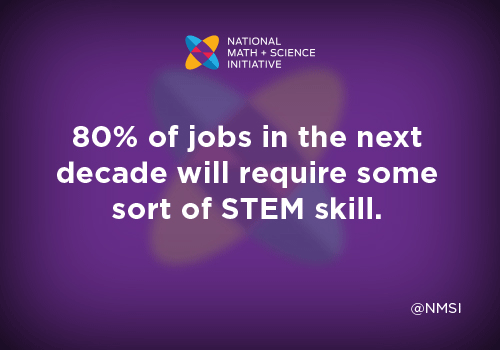Student Skills and Graduate Success The Need for Algebra II
Timothy Huneycutt |
November 21, 2013
 We have long stressed the immediate need for a stronger focus on the subjects of math and science in America’s education system. The need for more rigorous and cohesive STEM instruction can been seen as early as the elementary grade levels, and as students move through the middle and high school grades, the importance of an effective and engaging education becomes all the more prevalent. Students are struggling in these critical subjects, and the ripple effect of their struggles has culminated into a nationwide STEM crisis. Therefore, it is no small claim to say that the decision of the Texas House Bill 5 (HB5) of 2013 to eliminate Algebra II as a requirement for high school graduation has the potential to be devastatingly disadvantageous for our students.
We have long stressed the immediate need for a stronger focus on the subjects of math and science in America’s education system. The need for more rigorous and cohesive STEM instruction can been seen as early as the elementary grade levels, and as students move through the middle and high school grades, the importance of an effective and engaging education becomes all the more prevalent. Students are struggling in these critical subjects, and the ripple effect of their struggles has culminated into a nationwide STEM crisis. Therefore, it is no small claim to say that the decision of the Texas House Bill 5 (HB5) of 2013 to eliminate Algebra II as a requirement for high school graduation has the potential to be devastatingly disadvantageous for our students.
The issue of HB5 is examined at length in a paper written by Dr. Michael Marder, a Professor of Physics and the Executive Director of the UTeach Science Program at the University of Texas at Austin – and while the paper mainly focuses on the state of Texas, Dr. Marder’s argument as a whole can be applied on a national scale; that is, he asserts that it is absolutely imperative that students learn Algebra II.
Dr. Marder writes that “the spirit of HB5 is to allow students freedom” – that is, it grants students the freedom to choose whether to take Algebra II in high school. However,Dr. Marder argues that a choice such as this will actually limit student freedom when pursuing future career opportunities by handicapping their mathematical skills before students enter college. Without mastering the critical thinking and processing skills that come from Algebra II instruction, students are left woefully under-prepared for the rigors of College Algebra. Remedial education then becomes a sudden and jarring barrier for high school graduates entering community college, resulting in lower graduation rates, more money wasted on remedial mathematics courses and fewer career opportunities for those under-prepared students.
In his paper, Dr. Marder also addresses the critics of required Algebra II instruction, who assert that the subject is pointless simply because students hate it and don’t need it for most jobs. However, according to most of the students Dr. Marder spoke with on campus, Algebra II was actually the only reason they were able to enter and persist in college. The subject equipped them with the critical thinking and processing skills they needed to handle the rigors of a college classroom and coursework. Furthermore, these kinds of skills are exactly what most employers are looking for in potential employees, regardless of whether the company operates within a STEM field. It’s not a matter of using complex algebra on a daily basis; it’s whether a potential employee possesses the skillset only a college degree holder possesses. Dr. Marder speculates this is because “degrees – and therefore algebra mastery – signify persistence, logical thinking, ability to solve complicated multi-step problems, and willingness to perform tasks whose importance is not immediately evident. These are desirable qualities in an employee, and particularly in a manager.”
NMSI proudly endorses Dr. Marder’s research, and we stand right alongside him in his call for the absolute necessity of Algebra II instruction. Our students already face so many difficulties at school; they shouldn’t have to worry whether they’re going to be ready for college and their careers – especially our minority and low income students. Without Algebra II as a requirement for high school graduation, they will not receive the support and knowledge needed to persist in those higher levels of math, thus widening the achievement gap further. According to NMSI CEO Sara Martinez Tucker, part of the problem is that “young, low-income, first generation students don’t have a perspective on the long run and the requirements for success. It’s not that they shouldn’t have a choice,” she says, “it’s that they aren’t given enough information and the resources to make that choice.”
But the battle over Algebra II is not yet finished for Texas legislators! Pending the decision of the Texas State Board of Education, Algebra II may still remain a required course for students seeking a high school diploma. Dr. Marder testified before the board on Wednesday, demanding as he does in his paper that students not be restrained by the “freedom” of Texas HB5. The board will vote on Friday on whether Algebra II will remain a required course.
Regardless of the board’s decision, though, we must make sure that our Algebra II teachers – and all of America’s educators – are getting the right kinds of resources, training, and support to help their students become college and career ready. We’ve already seen phenomenal success with our AP program across the country, and we’re forging new public-private partnerships to support even more schools. We are dedicated to transforming American education for the better, and we applaud the efforts of advocates such as Dr. Marder for standing firm for STEM education.
Click the Button to Tweet! - Students don’t need freedom from rigorous #STEM courses like Algebra II, they need more support. #HB5